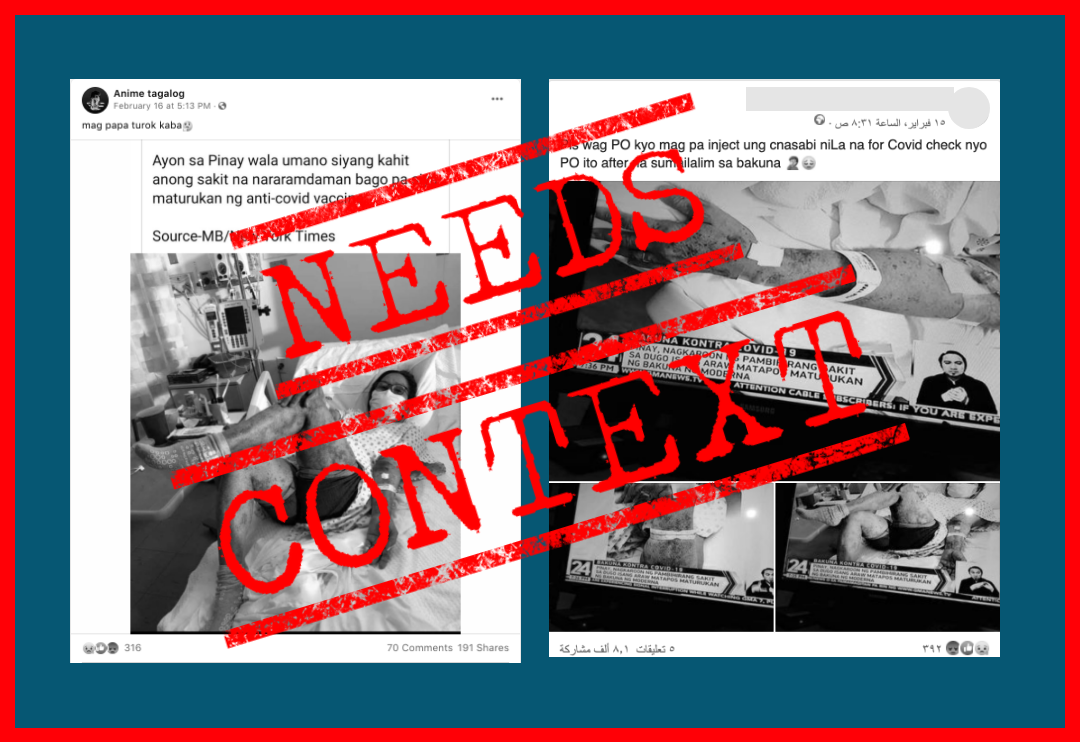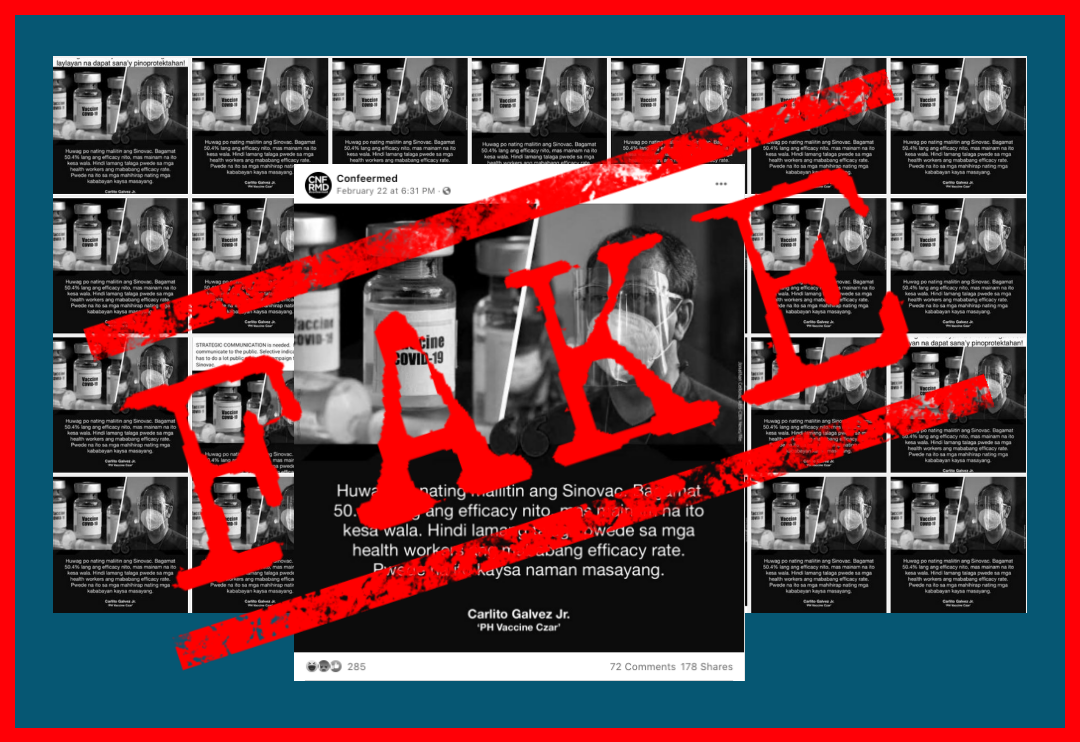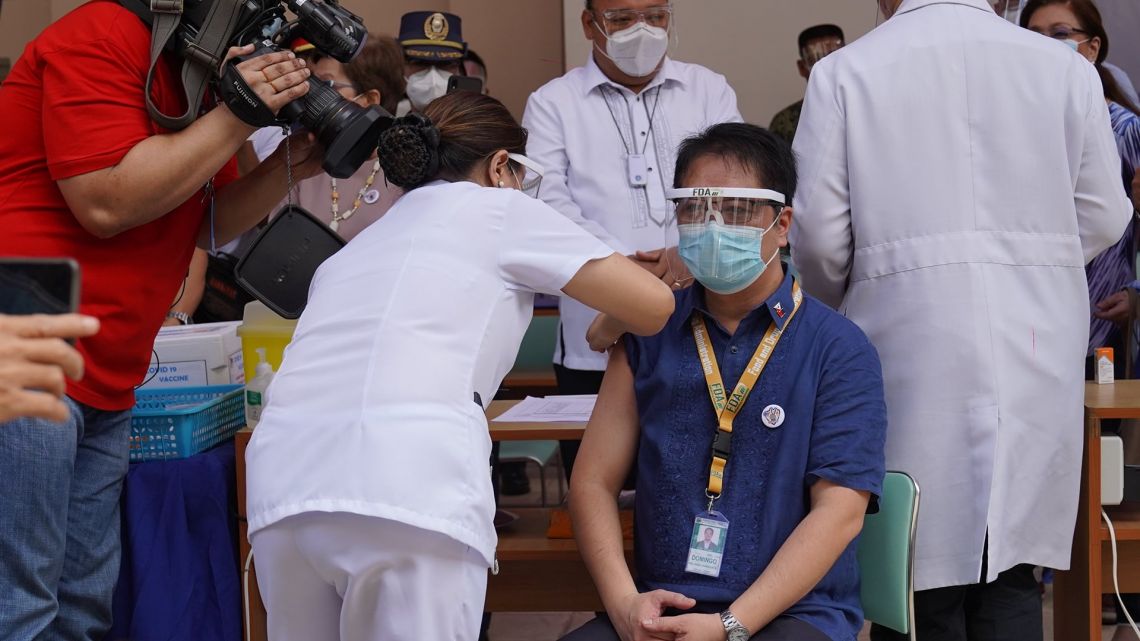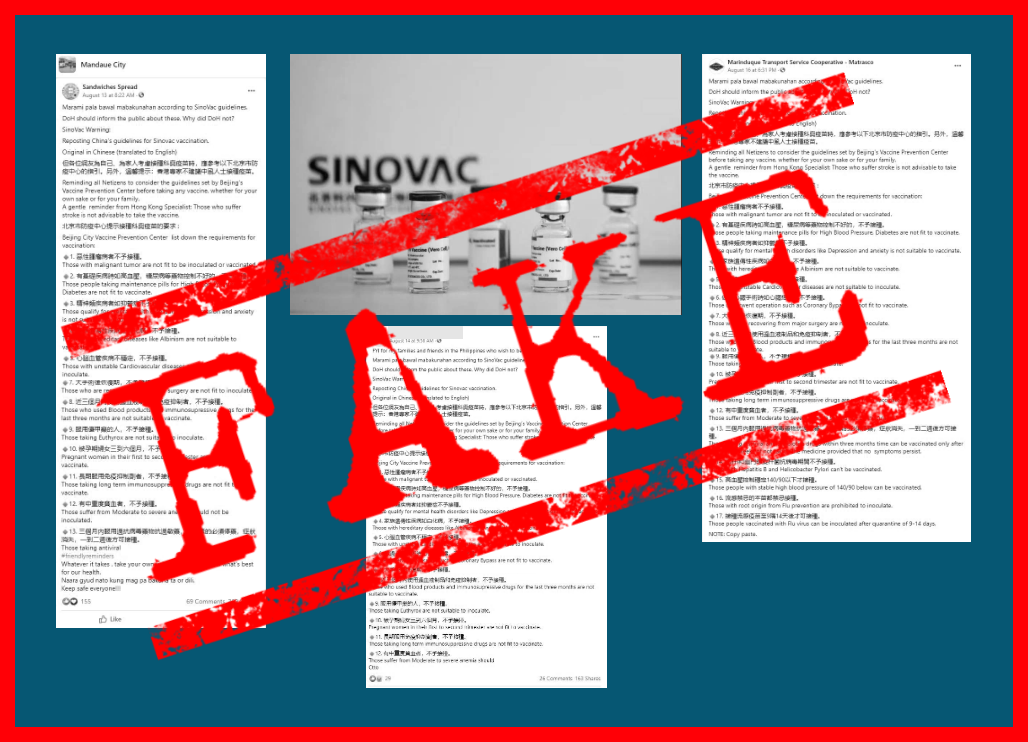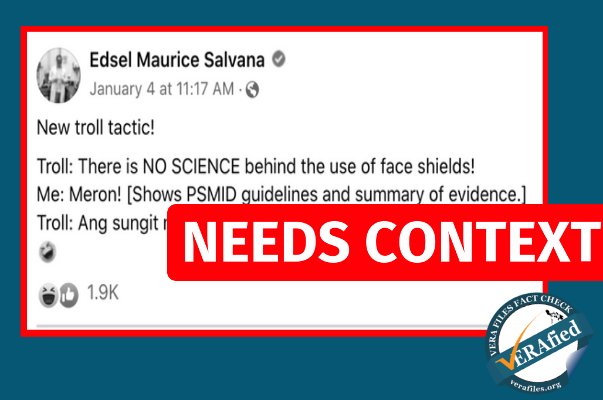Less than five hours after news of a governor who died of COVID-19 complications made the headlines on June 10, social media posts popped up painting his death as a cautionary tale against vaccination.
One of the most popular posts was by a Facebook user who uploaded two screenshots involving Davao del Sur Gov. Douglas Cagas: one of a news release on May 16 when the local chief executive got his first dose of CoronaVac, and another of a report about his passing.
“Ilang buhay paba ang mawawala para maniwala kayo na yung vax ang nagdadala ng pahamak (How many lives more should be lost for you to believe that it’s the vaccine that brings harm),” its caption read. The post was shared over 600 times.

Facebook post published on June 10 attributing Cagas’ death to vaccines, without basis.
That Cagas’ vaccine caused his death is baseless. Even his family has denied the connection.
As the Philippines enters the fifth month of its vaccination drive against the coronavirus disease 2019 (COVID-19), anti-vaccine and vaccine hesitant sentiments continue to find spaces to thrive online. Often, they capitalize on reports of infection, adverse events and deaths after vaccination. But these promote misconceptions, like vaccines protect against COVID-19 infections 100%. They also spread incomplete or skewed information.
And so vaccine experts are reminding the public: don’t simply rely on social media for health information.
“The social media is the worst source of information you can get as far as adverse events [are concerned],” Dr. Lulu Bravo, executive director of the Philippine Foundation for Vaccination and a vaccine expert of over 40 years, told VERA Files in an interview.
This is because social media posts may lack crucial information behind a patient’s adverse event. An adverse event refers to an unexpected medical problem after a person receives a drug, but is not necessarily caused by the drug or treatment that was given.
Bravo said before believing a post, it is worth asking whether publishers have the credibility to speak about a topic or whether they have underlying agendas, such as a political one or a commercial one.
“Just like when you are investigating a crime, you have to go for the reliable sources. You have to go to the real facts,” Bravo said. She advised that when faced with reports of adverse events related to vaccines, the public consult the Department of Health, the local epidemiology bureaus which do the investigation of the incident, or the hospital where the report came from.

The Facebook posts that wrongly connected Cagas’ death to vaccination are classic examples of online health content that lacked crucial information.
One expert consulted by VERA Files asked: “Do we know his medical condition before he got COVID-19?”
Dr. Melvin Sanicas, medical director of Takeda Vaccines, Inc. and a vaccinologist for over 10 years, said he was not surprised about the report of the governor’s infection, as none of the coronavirus vaccines available provides 100% protection against infection.
Instead, he said they are “very good” at preventing serious COVID-19 infection, hospitalization, and deaths. This means that the COVID-19 vaccines can be helpful at limiting infections to asymptomatic, mild or moderate levels. And this only happens two weeks after completing the vaccine’s second dose.
For CoronaVac, specifically, the World Health Organization says that in Brazil the drug was found to be 51% effective against symptomatic COVID-19 infection, and 100% against both hospitalization and deaths “starting 14 days after receiving the second dose.”
(In Chile, the rates were 65.3%, 87% and 86%, respectively. These may be different in the Philippines, said Bravo, as vaccine efficacy also depends on the virus variants present in a country and even the genes of the local population.)
In Cagas’ case, reports say he had only received his first dose of the drug, which he got as a member of the vulnerable senior citizen population. No public document or official report gave details on whether he had any comorbidities or pre-existing medical conditions.
Sanicas said: “Once infected, the chances of someone getting severe COVID-19 depends on the [person’s] age, comorbidities, immune status, (COVID) exposure and many others that we do not know yet.”
In the case of comorbidities, some diseases will not give people enough antibodies to fight off the COVID-19 infection, even if they receive the vaccine, explained Bravo.
“People who have been on steroids, people who have immunocompromised conditions, people who’ve had HIV or AIDS, or people who are under cancer therapy, they will not respond well to the vaccines, whatever vaccines you give,” she said, again stressing that there are many factors to consider and that people should not simply have a diet of information from social media sources.

At least two other Facebook posts about Cagas’ death made mention and expressed doubt about reports of “coincidental” adverse events. But the vaccine experts emphasize that it is crucial to understand what this means.
If a group of people is followed over time, some of them will die from old age, diseases or accidents, Sanicas said. Current data show over 4.1 billion doses of COVID-19 vaccines have been administered globally. And if the people who received these are monitored, some are expected to die of old age, diseases and accidents, he added.
“It doesn’t mean that [the drug] caused the incident. It just means that there were two incidents that came about at the same time but it doesn’t mean that they are related,” explained Bravo.
In the Philippines, as of July 25, only about 0.30% or 51,882 cases of mild to serious adverse events have been reported out of the over 17.2 million jabs of COVID-19 vaccines given to Filipinos.
This includes 494 reports of deaths. But the Food and Drug Administration (FDA) said in its July 25 report on suspected adverse events that this “does not necessarily mean that the vaccine caused the events.”
According to the FDA, these reported cases are being assessed by an independent committee, and what is known so far is that nearly half (215) have been found to be unrelated to the COVID-19 vaccines, 16 were “indeterminate,” and 12 “unclassifiable,” while the rest are under investigation.
Some involved confirmed COVID-19 infections that led to severe cases, while many of those who died had multiple existing comorbidities such as heart disease, illnesses that affect blood flow to the brain, cancer, diabetes, and infections like pneumonia.
“People tend to focus on the one case (of an adverse reaction) for them to be scared and concerned [versus] the millions of people who have been vaccinated and protected from serious COVID-19,” said Sanicas.
To end the pandemic, the vaccine experts said the Philippines should focus on vaccinating as many people as possible, to be able to reach herd immunity and reduce transmission of the disease.
In a slightly different reaction to Cagas’ death — expressing vaccine hesitancy than flat-out anti-vaccine sentiment — one Facebook user encouraged others to “wait a few years” to “ensure the safety” of COVID-19 vaccines.
To this, Bravo responded: “You cannot wait, that’s the reason you have an emergency authorization,” referring to the emergency use authorizations being given by drug authorities globally to COVID-19 vaccines that have passed their assessment.
“In fact, that is precisely why we do not wait until the end of the clinical trials, because one year after COVID, how many millions have died,” she added. As of publishing, COVID-19 deaths around the world stand at 4.25 million, and 28,141 locally.
“You can wait and wait and wait. Aanhin pa ang damo kung patay na ang kabayo (What good would the grass be if the horse is already dead)?”

